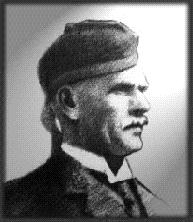William Alexander Smith (Boys Brigade)
Introduction[editar]
William Alexander Smith (October 27, 1854 - May 10, 1914) was born in Thurso, Scotland. He founded the Boys' Brigade on October 4th 1883 at Free Church Mission Hall, North Woodside Road, Glasgow.
History[editar]
William Smith was born on 27th October 1854 at Pennyland House, Thurso, Scotland. At 15 he moved to Glasgow to work in his uncle's business. While there, he joined the volunteers and by 19 he had become a Lance Corporal in the 1st Lanarkshire Rifle Volunteers. The very same year he joined the church after hearing the evangelists Moody & Sankey.
By 1883 William Smith had become a Lieutenant and was teaching in the North Woodside Mission Sunday School. The boys in his Sunday School class were a challenge, and he was open to new ideas about how best to deal with them. Someone suggested that the methods used in the volunteers might be appropriate, and by this inspiration the Boys' Brigade was created.
William Smith took a leading role in the new organisation, accepting a full-time post as the first Brigade Secretary in 1887. He worked non-stop for the movement, on two occasions even crossing the Atlantic to promote the Boys' Brigade in Canada and the U.S.A. Throughout he remained Captain of the 1st Glasgow company, rarely missing a meeting.
In 1909 William Smith was knighted by King Edward VII for his service to boys.
Sir William Smith died on 10th May 1914 after being suddenly taken ill at a Boys' Brigade meeting in London. He was buried in Glasgow.
Early Days of the Boy Brigade[editar]
For the first year, the 1st Glasgow company was alone, but shortly afterwards this new method of dealing with boys began to spread. By the end of the third year the movement numbered 2,000 boys, mostly in Scotland, centred around Glasgow, with companies ranged from Ayr to Inverness.
Shortly afterwards the movement filtered southward into England, all the way to London itself. In 1887 the BB's advance crossed the sea, with the formation of the 1st Jersey, and then across the Irish sea, when the 1st Belfast was formed in 1888 and the 1st Dublin formed in 1890.
The movement's great advance continued, with missionary companies soon developed overseas, usually at isolated stations and outposts. Perhaps the most notable was the growth in Nigeria. The organisation also spread across the Atlantic, to Canada and the U.S.A., encouraged by the founder's visits there in 1895 and 1907.
It was not all plain sailing though. There was often opposition and criticism, and many Boys were rough and unruly and not as civilised as those today. The glengarry cap would sometimes attract the scornful cry of "Scotchie! Scotchie!", and in the worst cases drill parades were conducted under a fusillade of stones and bricks thrown upon roofs and through windows!
From the early years, the leaders of the companies had come together to form the Council of the Boys' Brigade, providing the machinery for the administration of the movement. In 1887 William Smith was appointed as the first full-time Brigade Secretary, and he dedicated his time to the organisation. He brought many influential people into the organisation to strengthen its advance, including the Duke of York, who filled the position of Patron as prince and King for forty years.
One early innovation was to hold a camp - at the time, public opinion was aghast at the idea of Boys camping out in the "wilds"! The first camp by the 1st Glasgow company was held in a building at Tighnabruach on the Kyles of Bute in 1886. William Smith was an experienced yachtsman, and each squad had its own craft - it was a sight indeed to see the boats in nautical array on the placid waters of Bute. Camping spread rapidly and camping under canvas soon became the normal order of the day. Often camping became looked to as the crowning of the company's year.
In 1903 the annual display at the Royal Albert Hall was of special significance - from it can be traced the very start of the Boy Scout movement! General Baden-Powell, back from his exploits in Mafeking, agreed to preside over the forthcoming display and began a sincere friendship with the founder. Baden-Powell saw the possibility of teaching the Boys the art of Scouting. The seeds of the Scout Movement had been sown and were soon to spread like a prairie fire.
Connection to Scouting[editar]
William Smith was a friend of Baden-Powell and invited B.P. to be vice president of the Boys Brigade in 1904(?)
